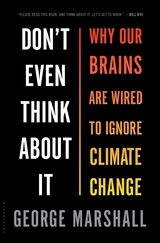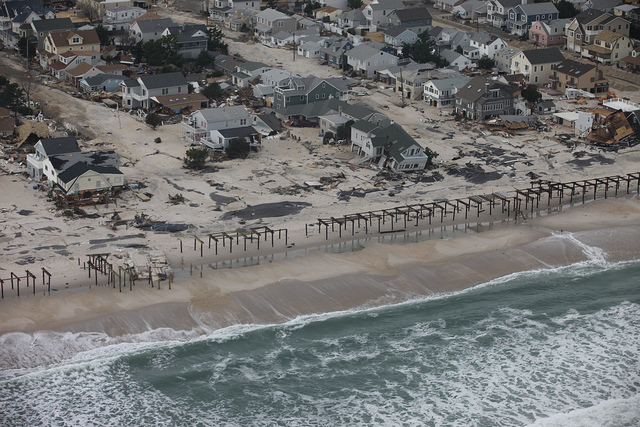New Jersey Future Blog
How Can We Discuss Climate Change Constructively?
December 2nd, 2014 by Steve Nelson
 Climate change is a topic that often creates heated discussions when it is brought up. Must it? Are there ways to talk about it that can lead to constructive dialogue (and maybe action) instead?
Climate change is a topic that often creates heated discussions when it is brought up. Must it? Are there ways to talk about it that can lead to constructive dialogue (and maybe action) instead?
George Marshall, co-founder of Climate Outreach and Information Network (COIN) and author of the recently released Don’t Even Think About It: Why Our Brains Are Wired to Ignore Climate Change, spoke about this recently in a lecture at Rutgers’ Cook Campus, and provided a cogent outline of why we humans have difficulty dealing with climate change. More importantly, he offered ideas on how to engage and communicate with people who want to ignore or deny it.
A key point for Marshall is the distinction is between our ability to pay attention and our ability to NOT pay attention. This is an emerging topic in the social sciences and is very relevant to climate-change conversations. Because climate change is long-term, with no visible or obvious “enemy,” and has uncertain timeframe, impacts and potential loss, Marshall cites cognitive psychologists as calling climate change a “perfect storm” for us to not pay attention to. Psychology Today had a blog post about the mismatch between these factors and our brain’s ability to process the threat of climate change. Another key point in Marshall’s talk was that people’s worldviews (e.g., belief in small government vs. big government; or in individual responsibility vs. societal responsibility) have a huge impact on their views on climate change, and that the politicization of climate change makes things worse.
Marshall cites a study that showed that one-third of people don’t talk about climate change in what he refers to as a “constructed silence;” that is, we consciously choose not to talk about it. He takes issue with the depiction of climate change as too hard for our brains to handle, and suggests that climate change is not in the future; rather, we have placed it in the future so that we don’t need to address it. By contrast, he notes, there are many things that are uncertain but to which we do respond — the possibility of global terrorism, for example. There is no reason we cannot be equally responsive to the threat of climate change.
Marshall offers six key recommendations for getting people to pay attention to climate change and engage in constructive conversations about it:
- Find common ground; don’t approach it as an argument to “win;”
- Treat others with the same respect that you would like them to have for you;
- Hold and own your views: “This is what I believe and this is why;”
- Understand others’ worldview so you can make climate change relevant to them and speak to their interests and desires;
- Point out benefits. If they are willing to acknowledge climate change, how will they benefit? What will they get?
Finally, Marshall stressed repeatedly the need to appeal to people’s emotional side, by telling stories as a way to personalize the topic and the impacts without using numbers and graphs.
Marshall also blogs at www.talkingclimate.org.
Profile of George Marshall in Yale Climate Connections.

















Constructive conversations are key to advancing many solutions such as a sustainable economy. We need to also do business better such as using honest risk management (many people also don’t want to talk about risk!)
Investigating impacts across social, environmental and economic systems including over the long run, realizing and assigning related impact costs rather than externalizing them onto the future state, is essential to avoid insurmountable costs from ignored assessments. I would also dare to suggest that reaping short term profits while creating unassigned long term costs is a form of thievery.
While I agree that climate change is tough to talk about, there is so much debate on this topic that it feels like the talking is distracting us from acting. We are also dangerously immobilized by a false sense of separation; us and them is not reality- we are all in this together whether we like it or not!
Indeed we need to keep seeking common ground AND act local, start wherever you are at, knowing that small changes can and do make a difference.
Climate change is a moral issue, just like the way our legal system has been unfairly treating minorities and immigrants. Sea level rise is real! The rate of change is increasing. Lots of people are going to die!
I agree with Jerry that reaping short term profits while creating unassigned long term costs is a form of thievery!
Risk management is not just for the insurance companies. We all assess common risks every day. Those who say that the climate science is just theoretical should realize that gravity is also just a theory, and we all accept that as real.